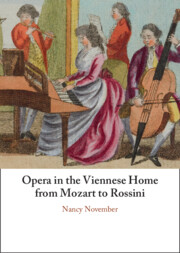Refine search
Actions for selected content:
122 results
25 - Poetry and the State (1945 to the Present)
-
-
- Book:
- The Cambridge History of Australian Poetry
- Published online:
- 19 November 2025
- Print publication:
- 11 December 2025, pp 476-491
-
- Chapter
- Export citation
5 - Everyday Citizens
- from Part II - Citizenship Practices in the Settler State (1870–1903)
-
- Book:
- Unsettled Subjects
- Published online:
- 13 November 2025
- Print publication:
- 20 November 2025, pp 113-137
-
- Chapter
- Export citation
Chapter 5 - Hoodoo Conversions
-
- Book:
- Manufacturing Dissent
- Published online:
- 03 October 2025
- Print publication:
- 21 August 2025, pp 166-210
-
- Chapter
- Export citation
2 - The Press and American Democracy
- from Part II - Democracy and the Press Function
-
-
- Book:
- The Future of Press Freedom
- Published online:
- 25 July 2025
- Print publication:
- 24 July 2025, pp 17-27
-
- Chapter
-
- You have access
- Open access
- HTML
- Export citation
Chapter 1 - Translating Roman Republican Political Culture
- from Part I - Original Essays
-
-
- Book:
- The Roman Republic and Political Culture
- Published online:
- 30 January 2025
- Print publication:
- 06 February 2025, pp 3-26
-
- Chapter
- Export citation
A reply to Komárek
-
- Journal:
- European Law Open / Volume 3 / Issue 3 / September 2024
- Published online by Cambridge University Press:
- 27 January 2025, pp. 668-674
-
- Article
-
- You have access
- Open access
- HTML
- Export citation
2 - The Internet, Democracy, and Misinformation
- from Part I - Theoretical Approaches to the Disinformation Problem
-
-
- Book:
- Disinformation, Misinformation, and Democracy
- Published online:
- 09 January 2025
- Print publication:
- 23 January 2025, pp 37-49
-
- Chapter
-
- You have access
- Open access
- HTML
- Export citation
5 - Debating Language Policies
-
- Book:
- Language Policy in Action
- Published online:
- 05 December 2024
- Print publication:
- 12 December 2024, pp 83-106
-
- Chapter
- Export citation
2.2 - The Court
- from History 2 - Mechanisms
-
-
- Book:
- The New Cambridge History of Russian Literature
- Published online:
- 31 December 2024
- Print publication:
- 12 December 2024, pp 241-257
-
- Chapter
- Export citation
Chapter 3 - Enlightenment Theology and the Protestant Public
- from Part I - Recasting German Protestantism, 1750–1790
-
- Book:
- Enlightenment's Reformation
- Published online:
- 21 December 2024
- Print publication:
- 05 December 2024, pp 91-122
-
- Chapter
- Export citation
6 - Openness and Closure
- from Part II - Concepts and Metaphors
-
-
- Book:
- Rethinking Global History
- Published online:
- 14 November 2024
- Print publication:
- 21 November 2024, pp 139-160
-
- Chapter
-
- You have access
- Open access
- HTML
- Export citation
Kant on the Despotic Danger of a World State
-
- Journal:
- Kantian Review / Volume 29 / Issue 3 / September 2024
- Published online by Cambridge University Press:
- 14 October 2024, pp. 387-404
- Print publication:
- September 2024
-
- Article
- Export citation
4 - Incoherence Brought to Order: Empiricism and the Essay
- from Part I - Forming the British Essay
-
-
- Book:
- The Cambridge History of the British Essay
- Published online:
- 31 October 2024
- Print publication:
- 04 July 2024, pp 48-62
-
- Chapter
- Export citation
43 - The Essay and the Public Intellectual
- from Part V - The Essay and the Essayistic Today
-
-
- Book:
- The Cambridge History of the British Essay
- Published online:
- 31 October 2024
- Print publication:
- 04 July 2024, pp 650-664
-
- Chapter
- Export citation
Chapter 8 - The Enlightenment
- from Part II - Pan-European Moods and Movements
-
-
- Book:
- Europe in British Literature and Culture
- Published online:
- 06 June 2024
- Print publication:
- 13 June 2024, pp 133-148
-
- Chapter
- Export citation
2 - Deliberation for Realists and Skeptics
-
- Book:
- Deliberative Democracy for Diabolical Times
- Published online:
- 28 March 2024
- Print publication:
- 04 April 2024, pp 30-51
-
- Chapter
- Export citation
1 - An Introduction for Diabolical Times
-
- Book:
- Deliberative Democracy for Diabolical Times
- Published online:
- 28 March 2024
- Print publication:
- 04 April 2024, pp 1-29
-
- Chapter
- Export citation
Recovering the Dalit Public Sphere: Vernacular Liberalism in Late Colonial North India
-
- Journal:
- Comparative Studies in Society and History / Volume 66 / Issue 3 / July 2024
- Published online by Cambridge University Press:
- 01 April 2024, pp. 700-725
-
- Article
-
- You have access
- Open access
- HTML
- Export citation

Opera in the Viennese Home from Mozart to Rossini
-
- Published online:
- 18 February 2024
- Print publication:
- 18 January 2024
14 - Nonprofits as Facilitators of National Self-development
- from Part III - New Directions
-
-
- Book:
- Reimagining Nonprofits
- Published online:
- 11 January 2024
- Print publication:
- 01 February 2024, pp 273-290
-
- Chapter
- Export citation
